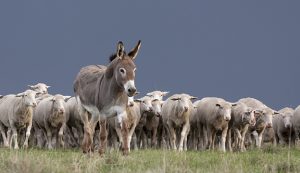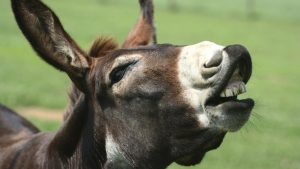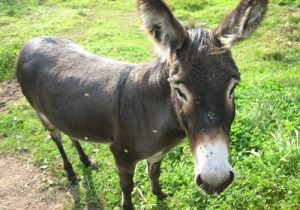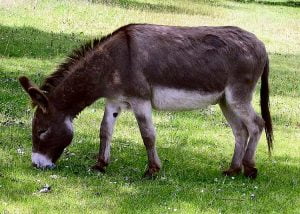Are donkeys just slower, stubbier horses or are they something more? Many in the U.S. may believe this to be true and while the number of horse lovers far exceeds that of donkey enthusiasts, the truth is a bit more nuanced. Donkeys are not only an entirely separate species, but they also have attributes that make them exceptional animals in their own right.
Donkeys were revered in ancient times as evidenced by archaeological discoveries. Researchers discovered 10 donkey skeletons in 2002 buried with an early Egyptian king. For donkeys to have been buried in such an area of high status indicates the animals were greatly valued and respected. Ancient donkeys were domesticated from the wild ass to carry heavy loads across the Sahara. Donkeys are well suited for desert life due to their strength, durability and capacity to survive on little vegetation and water. In fact, the use of donkeys to trek across the desert predates the use of camels. Washington University professor of archaeology in St. Louis Fiona Marshall, Ph. D., told the New York Times, “It was the first transport off human backs.”
Donkeys have a reputation for stubbornness leading many to question the creature’s intelligence. The reality is that donkeys are independent thinkers which tend to make them cautious. For example, if a donkey is unsure of where they are being led (a cliff or stream), they will stop to consider the situation prior to moving forward. If for example, a donkey is presented with an unfamiliar stream, they may paw at the water to gauge its depth before crossing. “They like to think before they act,” says Dr. Marshall. “The reason may be that their ancestor, the African wild ass, is not a herd animal. Wild asses have individual territories, and each must decide where to go and when to eat, run or fight.” Dr. Marshall further states, “Donkeys have retained some of that thoughtful intelligence. They like to decide for themselves.”
It is this independence and thoughtful intelligence that highlights another valuable yet lessor known donkey attribute beyond packing: guarding. Donkeys are excellent “guard dogs” for animals like sheep and goats. Used by many farmers, donkeys protect their herds through vocalization and then by quickly attacking. Donkeys are swift to charge and fight predator dogs, coyotes, foxes and mountain lions that do not heed their vocal warnings.
The Ontario Ministry of Agriculture, Food and Rural Affairs (OMAFRA) has a section of their website that provides guidelines for using donkeys to guard sheep. The OMAFRA website states, “Donkeys rely predominantly on sight and sound to detect intruders. When approached, sheep will tend to move so the guard animal is between the intruder and themselves. The donkeys’ loud brays and quick pursuit will scare away predators and may also alert the shepherd. In most instances donkeys will confront and chase dogs or coyotes out of the pasture. If the canines do not retreat quickly the donkeys will attack them by rising up on their hind legs and striking with both front feet. A sold blow can injure, kill or at the very least discourage the predator.”
On the lighter side, people who love donkeys are quick to let you know that these creatures make loyal, affectionate and playful pets with personalities that rival dogs. “It’s a dog you can ride,” states Tripledale Farm donkey owner Kimberly Brockett of Guilford, CT. Donkeys are said to be more personable than horses and make great hiking companions. In some instances, donkeys are utilized as therapy animals. Although donkeys enjoy human companionship and interaction, they thrive best when paired with a donkey buddy. Longhopes Donkey Shelter founder Kathy Dean was quoted in the Denver Post stating, “I like to call them big, overgrown dogs…But really, the donkey is the New Age equine.”
This article was adapted from a Healthy Pets story by Dr. Karen Becker titled “Donkey Love: Little-Known Facts About Donkeys.”






